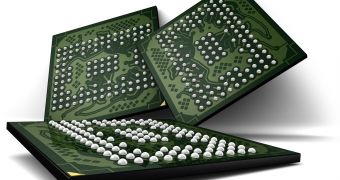Micron announced today the availability of the world’s first mobile phase change memory in a dual-chip/multi-chip package for mobile devices. There is a lot to say about PCM memory, but the shortest definition is that it is a flash memory replacement with very high write speeds and great durability.
Like we just said, phase change memory (PCM) is a direct competitor to flash storage technology, but it can also act like a RAM chip.
There was a lot of research done in this field and slowly, but surely, companies involved in PCM research gave up on using it as a RAM alternative and concentrated on building a viable storage alternative.
The two main advantages PCM has over NAND is the fact that write speeds are greatly increased, while the endurance is many times higher.
Most SSDs using 25nm NAND have a rated durability of 3,000 or 5,000 program/erase (P/E) cycles, which translates in a lifetime of 5 to 10 years of daily usage.
A storage device using PCM technology is rated at more than 100,000 P/E cycles, thus making it at least 20 times more durable than today’s NAND, and durability is currently the most pressing issue in SSD industry.
PCM technology and any kind of memristor that uses the phase change concept is based on the amorphous and crystalline states of chalcogenide.
The amorphous state is a high-resistance state where the material doesn’t allow the current to pass signaling a binary “0” and the crystalline state is a low-resistance state signaling a binary “1.”
The technology is times slower than today’s SRAM, but it is many times faster than NAND when writing, while the read speed is competitive. Add the increased durability and you have a strong NAND flash technological competitor.
If PCM will manage to successfully compete against NAND on price it still remains to be seen.
Instead of launching a high-capacity PCM device like Samsung’s 8 Gb PCM chip in 20nm technology launched last year, Micron is offering a multi-chip package containing 1 Gb for software and operating system storage and 512 Mbit LPDDR2 high-speed memory.

 14 DAY TRIAL //
14 DAY TRIAL //